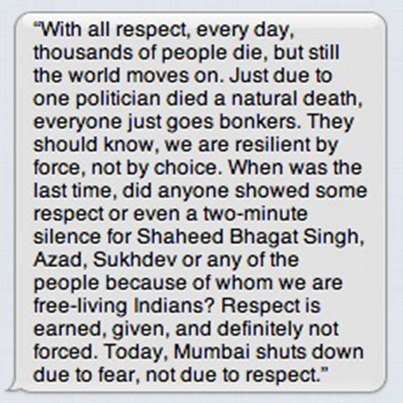
In all our countries we have things called ‘shok dibosh‘ (days of mourning), imposed upon us. We mourn by state dispensation for some leader or other, regardless of the lives they led. While calling them shahid‘s merely because they were killed might be a bit extreme, one could perhaps sympathise with the fact that they died in the course (if not call) of their duty. Ordinary people die in the hundreds in launch disasters every year. Slums catch fire mysteriously before developers move in on city land. Road disasters every day leave us unmoved, until the death of someone close, or prominent, moves us to anger. Garment workers working in death traps die when their prisons cave in or catch fire. We have our moments of rage, a temporary outburst, but there is no systemic change, for these moments are not remembered. The death of the insignificant, remains insignificant. But a politician or a wealthy person dying, even a natural death, raises the person to sainthood. Suddenly we forget who they were while they lived. Eulogies are written for the shomajshebi (philanthropist), who is said to have left behind an adoring public. We are required to weep.
I have no wish to be insensitive to the pain of their dear ones. Praying for a departed soul, however one might choose to pray, is a response I have no problems with. But the forced collective self?flagellation?that is imposed on us, because a person of influence ceases to be, merely for having outlived ones life, leaves me befuddled. And when questions being raised upon their role while living becomes punishable by law, that law, like any unjust law, must be challenged.




Leave a Reply
You must be logged in to post a comment.